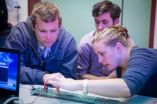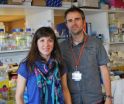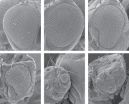(Press-News.org) Leaving one's job to become an entrepreneur is inarguably risky. But it may not be the fear of risk that makes entrepreneurs more determined to succeed. A new study finds entrepreneurs are also concerned about what they might lose in the transition from steady employment to startup.
In Entrepreneurship and Loss-Aversion in a Winner-Take-All Society, Professor John Morgan at UC Berkeley's Haas School of Business and co-author Dana Sisak, assistant professor at the Erasmus University Rotterdam, focused on the powerful impact of loss aversion.
Loss aversion, or the fear of losing one's salary at a full-time job, along with its prestige, is directly linked to the amount of effort an entrepreneur puts into a startup. Loss aversion, the researchers found, is what drives most entrepreneurs, not a love of risk.
"There is a view that entrepreneurs are often overconfident gamblers, who thrive on risk, yet there is little evidence to support this view," says Morgan, who studies competition in online markets at the University of California, Berkeley's Haas School of Business. "Entrepreneurs aren't Steve Jobs. They're just ordinary people who want to start a business. I wanted to try to understand a little better what motivated those individuals."
Many studies focus on what makes a successful entrepreneur different than the rest of us. Morgan sought to learn what motivates individuals to sacrifice a secure job, and what determines an entrepreneur's effort to succeed.
The study is based on a theoretical model the researchers developed and was inspired by the dramatic stories people like to tell about risk-taking entrepreneurs.
All entrepreneurs have a "reference point," which defines how they feel about their salary or, say, happiness level, compared to others, Morgan says. That reference point is not connected to profits and losses, but is directly linked to how much or little the entrepreneurs are willing to lose when starting a company.
Morgan and Sisak found an entrepreneur's level of ongoing concern about loss aversion correlates with entrepreneurial effort. In other words, entrepreneurs who put a high stake on avoiding loss – more so than acquiring new gains – worked harder.
Morgan used a winner-take-all framework, which is common within the Internet startup environment, for his study of entrepreneurs. Startups such as Facebook or Twitter might not offer the best platforms, but still dominate their markets. In markets such as real estate, where there is no clear single winner, this model would be less appropriate, Morgan says. "For every Facebook, there were hundreds of failed ventures," he says. "We model this aspect of entrepreneurial markets explicitly." This research can help entrepreneurs gain self-knowledge so they make better decisions and have a clear understanding of "why they're doing what they're doing," Morgan says.
"One of the most important traps entrepreneurs fall into is when they're not experiencing success and they become increasingly willing to take risks because of where they are psychologically," he says. "One lesson from the research is to be careful when you are behind. It's not necessarily the best decision to double down."
In other words, risk aversion can be a good thing.
INFORMATION:
Morgan recently presented the paper at the Summer Institute in Competitive Strategy, presented by the Haas Marketing Group and sponsored by the Institute for Business Innovation.
See the paper here: http://faculty.haas.berkeley.edu/rjmorgan/LossAversion.pdf
Entrepreneurs aren't overconfident gamblers
Berkeley-Haas study finds loss aversion is directly linked to the amount of effort an entrepreneur puts into a startup
2014-09-17
ELSE PRESS RELEASES FROM THIS DATE:
Oxides discovered by CCNY team could advance memory devices
2014-09-17
The quest for the ultimate memory device for computing may have just taken an encouraging step forward. Researchers at The City College of New York led by chemist Stephen O'Brien have discovered new complex oxides that exhibit both magnetic and ferroelectric properties.
Combining both properties is very exciting scientifically for the coupling that can occur between them and for the devices that might ultimately be designed, in logic circuits or spintronics. Combining these two properties in a single material, however, has proved difficult until now.
Using an innovative ...
Engineers develop algorithms to switch out and recharge battery modules in electric cars
2014-09-17
Imagine being able to switch out the batteries in electric cars just like you switch out batteries in a photo camera or flashlight. A team of engineers at the University of California, San Diego, are trying to accomplish just that, in partnership with a local San Diego engineering company.
They have developed smaller units within the battery, called modules, and a battery management system that will allow them to swap out and recharge the modules, rather than swapping out the whole battery, which is cumbersome and requires large, heavy equipment. They recently presented ...
US health system not properly designed to meet needs of patients nearing end of life, says IOM
2014-09-17
WASHINGTON -- The U.S. health care system is not properly designed to meet the needs of patients nearing the end of life and those of their families, and major changes to the system are necessary, says a new report from the Institute of Medicine. The 21-member committee that wrote the report envisioned an approach to end-of-life care that integrates traditional medical care and social services and that is high-quality, affordable, and sustainable. The committee called for more "advance care planning" for end-of-life by individuals, for improved training and credentialing ...
First blood test to diagnose depression in adults
2014-09-17
CHICAGO --- The first blood test to diagnose major depression in adults has been developed by Northwestern Medicine® scientists, a breakthrough approach that provides the first objective, scientific diagnosis for depression. The test identifies depression by measuring the levels of nine RNA blood markers. RNA molecules are the messengers that interpret the DNA genetic code and carry out its instructions.
The blood test also predicts who will benefit from cognitive behavioral therapy based on the behavior of some of the markers. This will provide the opportunity for more ...
Many throat cancer patients can skip neck surgery
2014-09-17
A new study shows that patients with human papillomavirus (HPV) – the same virus associated with both cervical and head and neck cancer – positive oropharyngeal cancer see significantly higher rates of complete response on a post-radiation neck dissection than those with HPV-negative oropharyngeal cancer. Fox Chase Cancer Center researchers presented the findings at the American Society for Radiation Oncology's 56th Annual Meeting on Wednesday, September 17.
"For patients that achieve a complete response, neck surgery is probably unnecessary," says Thomas J. Galloway, ...
Five genes to predict colorectal cancer relapses
2014-09-17
Researchers at the Catalan Institute of Oncology-Bellvitge Biomedical Research Institute (ICO-IDIBELL), led by David Garcia-Molleví have identified 5 genes differentially expressed in normal accompanying cells in colorectal tumors. Analysis of these genes could be used to classify colorectal tumors, predict the evolution of the patient and thus take appropriate clinical decisions to prevent relapses.
Biomarkers
Colorectal cancer is the most common in our population considering both sexes. About 30,000 new cases are diagnosed each year. Of these, approximately 70% are ...
Abnormal properties of cancer protein revealed in fly eyes
2014-09-17
EAST LANSING, Mich. – Mutations in the human retinoblastoma protein gene are a leading cause of eye cancer. Now, Michigan State University scientists have turned to fruit fly eyes to unlock the secrets of this important cancer gene.
In a paper featured on the cover of the current issue of the Journal of Biological Chemistry, Michigan State University researchers provide the first detailed examination of a set of mutations similar to those present in the human cancer gene, said Irina Pushel, MSU undergraduate and co-author.
"By systematically evaluating mutations of ...
Moffitt researchers help lead efforts to find new genetic links to prostate cancer
2014-09-17
Researchers at Moffitt Cancer Center, including Center Director Thomas A. Sellers, Ph.D., M.P.H., Jong Park, Ph.D. and Hui-Yi Lin, Ph.D., have discovered 23 new regions of the genome that influence the risk for developing prostate cancer, according to a study published Sept. 14 in Nature Genetics.
Prostate cancer is the most common non-skin cancer in American men. About 1 in 6 men will be diagnosed with the disease in his lifetime. Family history is the strongest risk factor. A man with one close relative, a brother or father with prostate cancer is twice as likely to ...
Yoga may help people with bipolar disorder, reports Journal of Psychiatric Practice
2014-09-17
September 17, 2014 – People with bipolar disorder who do yoga believe their yoga practice has significant mental health benefits, reports a survey study in the September Journal of Psychiatric Practice. The journal is published by Lippincott Williams & Wilkins, a part of Wolters Kluwer Health.
"Some individuals with bipolar disorder believe that yoga has had a significant positive impact on their life." according to the study by Dr Lisa A. Uebelacker of Butler Hospital and Brown University, Providence, R.I., and colleagues. But they note their survey shows that yoga ...
Protein variant may boost cardiovascular risk by hindering blood vessel repair
2014-09-17
DALLAS – September 17, 2014 – Researchers at UT Southwestern Medical Center have found that the most common variant of the circulating protein apolipoprotein E, called apoE3, helps repair the lining of blood vessels. Individuals with another variant, called apoE4, do not get the benefit of this repair, putting them at higher risk for cardiovascular disease.
"We believe that we have identified one mechanism by which apoE3 promotes a healthy cardiovascular system and why a genetic variant, apoE4, is detrimental," said Dr. Philip Shaul, Professor of Pediatrics and Vice Chair ...
LAST 30 PRESS RELEASES:
GLP-1 drugs associated with reduced need for emergency care for migraine
New knowledge on heritability paves the way for better treatment of people with chronic inflammatory bowel disease
Under the Lens: Microbiologists Nicola Holden and Gil Domingue weigh in on the raw milk debate
Science reveals why you can’t resist a snack – even when you’re full
Kidney cancer study finds belzutifan plus pembrolizumab post-surgery helps patients at high risk for relapse stay cancer-free longer
Alkali cation effects in electrochemical carbon dioxide reduction
Test platforms for charging wireless cars now fit on a bench
$3 million NIH grant funds national study of Medicare Advantage’s benefit expansion into social supports
Amplified Sciences achieves CAP accreditation for cutting-edge diagnostic lab
Fred Hutch announces 12 recipients of the annual Harold M. Weintraub Graduate Student Award
Native forest litter helps rebuild soil life in post-mining landscapes
Mountain soils in arid regions may emit more greenhouse gas as climate shifts, new study finds
Pairing biochar with other soil amendments could unlock stronger gains in soil health
Why do we get a skip in our step when we’re happy? Thank dopamine
UC Irvine scientists uncover cellular mechanism behind muscle repair
Platform to map living brain noninvasively takes next big step
Stress-testing the Cascadia Subduction Zone reveals variability that could impact how earthquakes spread
We may be underestimating the true carbon cost of northern wildfires
Blood test predicts which bladder cancer patients may safely skip surgery
Kennesaw State's Vijay Anand honored as National Academy of Inventors Senior Member
Recovery from whaling reveals the role of age in Humpback reproduction
Can the canny tick help prevent disease like MS and cancer?
Newcomer children show lower rates of emergency department use for non‑urgent conditions, study finds
Cognitive and neuropsychiatric function in former American football players
From trash to climate tech: rubber gloves find new life as carbon capturers materials
A step towards needed treatments for hantaviruses in new molecular map
Boys are more motivated, while girls are more compassionate?
Study identifies opposing roles for IL6 and IL6R in long-term mortality
AI accurately spots medical disorder from privacy-conscious hand images
Transient Pauli blocking for broadband ultrafast optical switching
[Press-News.org] Entrepreneurs aren't overconfident gamblersBerkeley-Haas study finds loss aversion is directly linked to the amount of effort an entrepreneur puts into a startup





